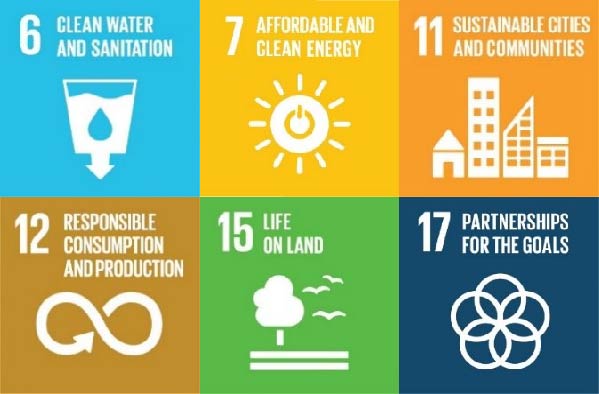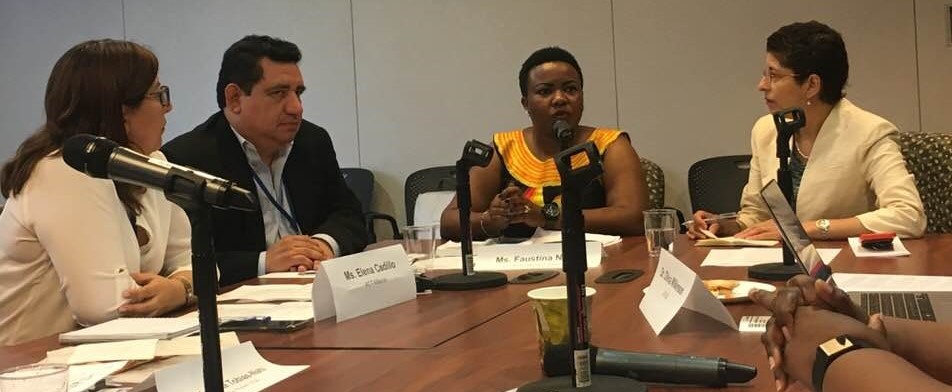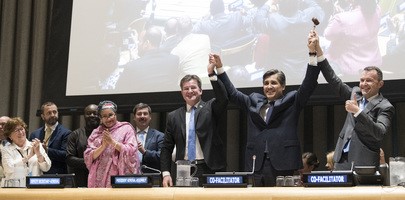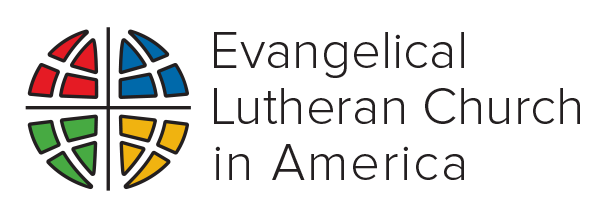|
Today, we present our ELCA Advocacy Update for the month of August. Please read below for important information on ELCA Advocacy efforts in Washington, across the country and throughout the world. To read the full version of the update and for more information on advocacy efforts from our Lutheran State Advocacy offices, visit our blog!
ELCA Advocacy, Washington D.C.
ELCAvotes: In the lead up to Election Day on November 6th, this
coming “God’s work. Our hands.” Sunday on Sept. 9, will feature ELCAvotes
advocacy resources to use during the day of service. This year’s resources will
focus on voting rights, including a background resource guide and a
template letter to Congress supporting the Voting Rights Advancement Act.
ELCAvotes is a non-partisan
initiative to expand the role of the church in encouraging voter participation.
Updated congregational resources, Lutheran Bible studies, factsheets and civic
participation guides are online at ELCA.org/votes. More ELCAvotes
resources, such as interfaith webinars, blogs and social media toolkits, will
be released over the summer and fall. Be sure to sign up to ELCAvotes to be the first to receive new resources!
FARM BILL UPDATE: In late July, the House of Representatives
voted to conference with the Senate on the 2018 farm bill. Many of our nation’s
most critical food and farm policies depend on the renewal of the farm bill,
impacting people from rural America to developing countries. Among the differences
between the House and Senate bills that need to be addressed are conservation programs
and the Supplemental Nutrition Assistance Program (SNAP).
As House
lawmakers head to their home districts for August recess, now is a critical
time to reach out to legislators in support of compassionate, comprehensive
policies that religious leaders have long supported. Find out how you can
coordinate action with your lawmakers while they are in town with the ELCA In-District Guide. ELCA Advocacy will share an updated action alert
in support of a comprehensive, bipartisan farm bill in August. Stay up to date with
the farm bill through ELCA Advocacy Blogs.
PREVENTION OF GENOCIDES AND ATROCITIES: On July 17, the House passed the Elie
Wiesel Genocide and Atrocities Prevention Act. If signed into law, it would
recognize preventing genocide and other atrocities as a core national security interest
and moral responsibility. ELCA Advocacy and ecumenical partners are major
supporters of the bill and its focus on atrocities worldwide.
As currently
written, the act would help coordinate U.S. efforts to prevent global
atrocities from occurring and also introduce prevention training for foreign service
officers. It would also require the president to update Congress on efforts
taken to minimize violence in countries at risk and provide global assessments
of instability, conflict and atrocities. Lutherans are encouraged to share
their opinion on the bill, and ELCA Advocacy will share an action alert with
more information on it in the coming weeks.
Lutheran Office for World Community
FORUM DISCUSSES “SUSTAINABLE
AND RESILIENT SOCIETIES”: In 2012,
the U.N. High-Level Political Forum on Sustainable Development (HLPF) was
mandated by the Conference on Sustainable Development. This year’s HLPF met
July 9-18 with the theme “Transformation towards
sustainable and resilient societies,” reviewing progress made toward the
Sustainable Development Goals (SDGs).

This year’s conference included 25 meetings, more than 250
side events and 46 voluntary national reviews attended by more than 2,200
participants. Read the closing remarks of Marie Chatardová, president of the U.N.
Economic and Social Council, here; those delivered by U.N. Secretary-General
António Guterres may be read here.
On July 16, the U.N. Population Fund, in collaboration with
U.N. faith-based partners, including The Lutheran World Federation and ACT
Alliance, offered the HLPF side event “Strengthening
Resilience Through Faith-Based Partnership: Women and Girls’ Health in the
Context of SDG 11.”
 Faustina Nillan Manyangu, national director for women and
children in the Evangelical Lutheran Church in Tanzania, was a panelist. Her
work focuses on vulnerable groups of women and children who are marginalized
and susceptible within the church and the community at large. Faustina Nillan Manyangu, national director for women and
children in the Evangelical Lutheran Church in Tanzania, was a panelist. Her
work focuses on vulnerable groups of women and children who are marginalized
and susceptible within the church and the community at large.
CONSENSUS
REACHED ON MIGRATION COMPACT: The
final intergovernmental negotiations for the draft Global Compact
for Safe, Orderly and Regular Migration were concluded on
July 13 by consensus, with formal adoption of the compact slated for December
in Marrakech, Morocco. A joint civil-society statement at the conclusion of the
negotiations highlighted some of the significant achievements:
- working
to end child detention;
- expanding
regular avenues for migration and measures for regularization as a way to
increase safe, orderly, and regular migration and reduce vulnerabilities;
- emphasizing
community-based alternatives to detention and not promoting detention as a
deterrent to irregular migration;
- protecting
migrants in situations of vulnerability, including those fleeing slow and
sudden natural disasters, the adverse effects of climate change and
environmental degradation;
- safeguarding
the rights of children by adhering to the principle of the best interest
of the child at all times and ensuring their protection and access to
sustainable solutions;
- ensuring
decent work and labor rights;
- promoting
concrete gender-responsive policies and the empowerment of women as agents
rather than from the lens of victims;
- guaranteeing
due process, individual assessment and effective remedy in return
procedures by upholding the prohibition on collective expulsion and the principle of non-refoulement;
- strengthening
the collection of data on migration to better inform humane policy responses in a manner that respects the right to privacy;
- investing
in sustainable development at national and local levels in order to honor
the right of migrants to live and support their families in their countries of origin; and
- cooperating
to provide international protection to migrants in situations of
vulnerability at borders.
They also noted: “Unfortunately, the compact falls short in
several important areas and in some aspects steps away from current
international standards and regional practice. For example: we regret that no
stronger language could be achieved on the non-criminalization of migrants and
of those who provide support to them, on firewalls, access to basic services
and on full labor rights and freedom of association for irregular migrant
workers.”
 At a news conference hailing the agreement, Miroslav Lajčák,
president of the 72nd Session of the General Assembly, said, “The reality is
that migration is here. It has been here for centuries. And it will be here for
centuries more. And this agreement addresses this reality. And it offers a way
to deal with it.” At a news conference hailing the agreement, Miroslav Lajčák,
president of the 72nd Session of the General Assembly, said, “The reality is
that migration is here. It has been here for centuries. And it will be here for
centuries more. And this agreement addresses this reality. And it offers a way
to deal with it.”
Miroslav
Lajčák, president of the 72nd session of the General Assembly, and co-facilitators
for the Global Compact on Migration process: Juan José Gómez Camacho, permanent representative of Mexico, and Jürg Lauber, permanent
representative of Switzerland, hold up the gavel at the end of the meeting.
Lutheran state advocacy efforts across the country
Find out all about the vast and incredibly important work and top priorities of Lutheran state advocacy networks across the country by visiting the ELCA Advocacy Blog.
(To view this email in your web browser, click here.) 
|




 Faustina Nillan Manyangu, national director for women and
children in the Evangelical Lutheran Church in Tanzania, was a panelist. Her
work focuses on vulnerable groups of women and children who are marginalized
and susceptible within the church and the community at large.
Faustina Nillan Manyangu, national director for women and
children in the Evangelical Lutheran Church in Tanzania, was a panelist. Her
work focuses on vulnerable groups of women and children who are marginalized
and susceptible within the church and the community at large. At a news conference hailing the agreement, Miroslav Lajčák,
president of the 72nd Session of the General Assembly, said, “The reality is
that migration is here. It has been here for centuries. And it will be here for
centuries more. And this agreement addresses this reality. And it offers a way
to deal with it.”
At a news conference hailing the agreement, Miroslav Lajčák,
president of the 72nd Session of the General Assembly, said, “The reality is
that migration is here. It has been here for centuries. And it will be here for
centuries more. And this agreement addresses this reality. And it offers a way
to deal with it.” 
